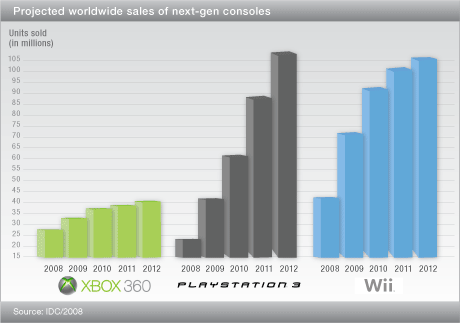The 34m PS4 & Xone WW number does represent as of end April.
Pourin one out for Zhuge.
Last generation we saw ~270M consoles sold by 6 years in to the generation.
My math only gets me to approximately 220m WW? (unless you're including 3DS & Vita?) Hmmm.
Same IDG that had this chart at the the start of last gen.
I will take their predictions with the grain of salt.
People make mistakes in assumptions when forecasting. That was a long time ago, however. Their current methodology is solid, if (imo) conservative.
But yeah, take all forecasting with a grain of salt. All forecasting does is calculate results based on a pool of assumptions. It's not prophecy, nor should it be seen as such. The assumptions were wrong at the time (assuming PS3 = PS2 benchmark, X360 = XBX benchmark in particular).
Console growth is happening in that Ps4 and Xbox One are selling faster than their last gen counterparts.
Well, then I think you want to say that a segment of the market is growing. However, the rest of it (Nintendo, HandHeld, Packaged PC games) have all had drastic declines, leading to declines overall. The good news is that there's not much more room to fall. The hurt has happened in those markets. But getting to growth? Tough to see unless we see more disruptive products hit the space to recapture the mass market (I guess VR would be the current Hope). Longer term? Anyone's guess, but tough to see a rebound in dedicated gaming hardware for the masses unless things change drastically (ie Cable & Satellite TV providers offering combo receiver/console boxes, for example).
Whatever the hell it is. (IDG currently labels it as the "Wii DS" in its forecasting models, because who knows)
This thread is full of USA = World mentality.
In 2011 (just a point in time comparison because the data is handy) EMEA accounted for 39% of the WW installed base on PS3 & X360. Now, EMEA accounts for around 42% of PS4 & Xone. In Packaged Software sales, EMEA is now 51% of the market on PS4 & Xone, where it accounted for 44% in 2011 on PS3 & X360. So yeah, good share growth in EMEA, and US is definitely not the world.
It's not just between generations, but even within generations, costs continue to rise. Killzone may be a particular exception -- I don't know, I haven't studied it -- but we're talking overall averages. Assassin's Creed III, for instance, cost more than all the ACs that came before it put together. Halo 4 was the same. Those may be outliers on the other end of the bellcurve, of course; what we're looking for is averages, and from what I can tell, the average is much higher than 20% increase over 5 years, although it's certainly possible it's 80% and not 100%.
It is more expensive to make games now, absolutely. But it's very tough to do an apples:apples vs prior generations. It is more expensive to push more pixels, sure. But the kinds of games being made now, and the scale at which they have to be produced... these games now have far more detail, content, and "stuff". Last gen, FPS was the rage, right? Making a 10-15 hour SP FPS with MP components cost far, far less than a 30 hour, open world, 1080p (give or take some p's), action game (which is now currently what sell best).
I don't think you can make a flat assumption on the increase. But a range of "More Expensive" to "Way More Expensive" to "Betting the Company on it More Expensive" is the right ballpark.


